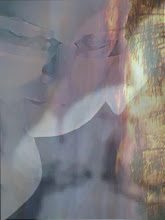My January term course is Restorative Justice and part of our evaluation is a daily reflective journal. I see this as a fine excuse (erm...opportunity) to blog every day. Since there's a grade involved, I'm likely to do it. If only the course were 27 days long, wouldn't it be habit-forming? Anyway, dear Readers, you might actually get bored of me if I posted anything substantive 27 days in a row! I'm already two days behind, so I need to catch up now.
Restorative justice (RJ) is kind of a perfect topic for this alter ego, The Closet Optimist. Because I want to believe in it, but I can hardly live in this world and not be a little bit cynical. Okay, a lot cynical. But, since I actually have to live in this world, I have to be kind of an optimist, or life would be too depressing. Same goes for this justice system that I've signed up for. It's kind of a f*cked up place, but it's what we've got. I've got to find hope within it somewhere. I take solace in the fact that there are good people working in a flawed (and that's putting it gently) system.
Things I'm thinking about in our non-traditional, traditional* circle format of learning and sharing together:
Sharing (ha ha, see title). It's kind of weird to be in a place where part of the process is to open up and share our own experiences. In situations of semi-familiarity, like class, I'm of two minds (at least) on the issue of personal disclosure. Some people learn and achieve understanding by relating their own stories to whatever topic is being discussed. I sort of occasionally find this annoying in (other) classes because it seems like every time some people raise their hand, it's to relate a story that may or may not actually add anything. I can't help but thinking snidely, "This one time, at band camp..." (OMG, I'm so mean.) I mean, sometimes it's totally relevant, and I do it too, but I feel like there's limits. Also, while genuine disclosures and sharing can be super meaningful, relevant and powerful, I hesitate about it at some points because I feel like it can be exploitive, in the vein of "Look at me, I'm legitimate!"
See, this is a perfect example about why context is important. Because to date, in the stuff that we've done in the circles (and ok, this is a day one journal, but I'm writing it on day three), none of that other (mean) stuff applies. In this context, that sense of opening up your own experiences makes perfect sense and without it the exercise would actually be kind of meaningless.
Feeling jaded, not wanting to be too open with my feelings, not wanting to be too personal, too enthusiastic about it. Though, I think I probably hide this well. And I know it's not just me. I find those chirpy enthusiastic idealists false and cloying, unless they can admit there's a limit to their idealism. (Which, by definition, precludes them from being chirpy, false and cloying.) There does not appear to be any of those in this class, which is kind of a relief. But still, I think we're mostly expected to be kind of hardened, so when we're required to be kind of humane, it feels like we're being suckers, and maybe suckered. This can be linked directly, I think, to that belief that some hold that a restorative process is a soft process, easier, lenient and insufficient to really mete out "justice". Anyone who thinks that has never had to face their demons, I think, because it's fecking hard to take responsibility for your actions and make peace with all those involved, including yourself and those you've harmed.
So, I feel like so far (because I don't want to make these posts too long and I'm going to wrap it up), this course is going to be a lot about my own relationship with the justice system, with my clients and my opponents. It's not about black letter law, in particular, because there's not too much of it, saving some case law on circle sentencing, some of the Criminal Code sentencing provisions (from which you can extrapolate the use of restorative processes), and the Youth Criminal Justice Act, which is explicitly restorative.
I don't know if I'll ever have the opportunity to participate in restorative processes early in my career (because someone will be bossing me around for a while), but at least I think I must try to incorporate some of the humanity of this process.
Humanity is good.
In music:
*Non-traditional in the sense of what we usually see in our justice system, but traditional in that the circle is borrowed, with respect, from traditional Aboriginal practices.
Subscribe to:
Post Comments (Atom)


No comments:
Post a Comment